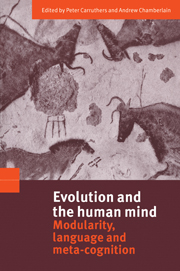Book contents
- Frontmatter
- Contents
- List of contributors
- Preface
- 1 Introduction
- 2 Massively modular minds: evolutionary psychology and cognitive architecture
- 3 Individual differences in early understanding of mind: genes, non-shared environment and modularity
- 4 Darwin in the madhouse: evolutionary psychology and the classification of mental disorders
- 5 Evolution of the modern mind and the origins of culture: religious concepts as a limiting-case
- 6 Symmetry and the evolution of the modular linguistic mind
- 7 Evolution, communication and the proper function of language
- 8 The evolution of knowledge
- 9 Mind, brain and material culture: an archaeological perspective
- 10 The evolution of strategic thinking
- 11 On the origin of the human mind
- 12 The evolution of consciousness
- 13 Evolution, consciousness and the internality of the mind
- References
- Author index
- Subject index
4 - Darwin in the madhouse: evolutionary psychology and the classification of mental disorders
Published online by Cambridge University Press: 18 December 2009
- Frontmatter
- Contents
- List of contributors
- Preface
- 1 Introduction
- 2 Massively modular minds: evolutionary psychology and cognitive architecture
- 3 Individual differences in early understanding of mind: genes, non-shared environment and modularity
- 4 Darwin in the madhouse: evolutionary psychology and the classification of mental disorders
- 5 Evolution of the modern mind and the origins of culture: religious concepts as a limiting-case
- 6 Symmetry and the evolution of the modular linguistic mind
- 7 Evolution, communication and the proper function of language
- 8 The evolution of knowledge
- 9 Mind, brain and material culture: an archaeological perspective
- 10 The evolution of strategic thinking
- 11 On the origin of the human mind
- 12 The evolution of consciousness
- 13 Evolution, consciousness and the internality of the mind
- References
- Author index
- Subject index
Summary
In recent years there has been a ground swell of interest in the application of evolutionary theory to issues in psychopathology (Nesse and Williams, 1995; Stevens and Price, 1996; McGuire and Troisi, 1998). Much of this work has been aimed at finding adaptationist explanations for a variety of mental disorders ranging from phobias to depression to schizophrenia. There has, however, been relatively little discussion of the implications that the theories proposed by evolutionary psychologists might have for the classification of mental disorders. This is the theme we propose to explore. We'll begin, in section 1, by providing a brief overview of the account of the mind advanced by evolutionary psychologists. In section 2 we'll explain why issues of taxonomy are important and why the dominant approach to the classification of mental disorders is radically and alarmingly unsatisfactory. We will also indicate why we think an alternative approach, based on theories in evolutionary psychology, is particularly promising. In section 3 we'll try to illustrate some of the virtues of the evolutionary-psychological approach to classification. The discussion in section 3 will highlight a quite fundamental distinction between those disorders that arise from the malfunction of a component of the mind and those that can be traced to the fact that our minds must now function in environments that are very different from the environments in which they evolved.
- Type
- Chapter
- Information
- Evolution and the Human MindModularity, Language and Meta-Cognition, pp. 62 - 92Publisher: Cambridge University PressPrint publication year: 2000
- 36
- Cited by



